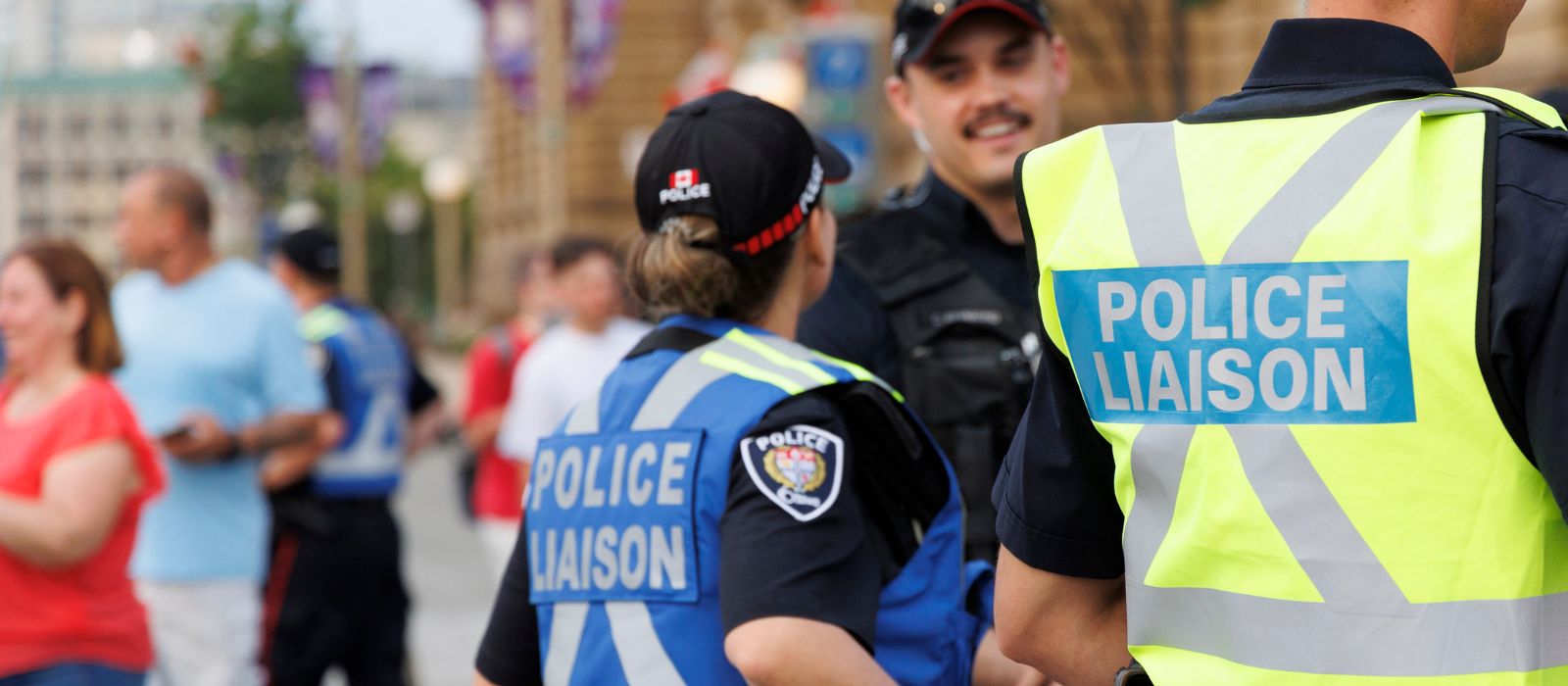Demonstrations and Protests
Police Liaison Team
Our Police Liaison Team (PLT) is part of the OPS response to events such as demonstrations, protests, rallies, marches, vigils and labour disputes.
PLT works with individuals or groups to facilitate peaceful events and is an excellent resource for those planning on organizing or attending an event.
For more information contact plt@ottawapolice.ca.
What are my rights in a protest, march or demonstration?
The Canadian Charter of Rights and Freedoms guarantees certain rights and fundamental freedoms, including the freedoms of opinion, expression and peaceful assembly.
Section 2 of the Charter states: Everyone has the following fundamental freedoms:
- freedom of conscience and religion;
- freedom of thought, belief, opinion and expression, including freedom of the press and other media of communication;
- freedom of peaceful assembly; and
- freedom of peaceful association.
These rights are not without limits
The Supreme Court has recognized that "freedom of expression does not extend to protect threats of violence or acts of violence. It would not protect the destruction of property, assaults, or other clearly unlawful conduct." In addition, in some cases, the reasonable limits prescribed by law will also apply.
Section 1 of the Charter, which provides for limitations on rights and freedoms, states:
The Canadian Charter of Rights and Freedoms guarantees the rights and freedoms set out in it, subject only to such reasonable limits prescribed by law as can be demonstrably justified in a free and democratic society.
The following is a list of some of the relevant Criminal Code sections that limit certain activities:
- blocking or obstructing a highway (Section 423(1)(g))
- causing a disturbance (Section 175)
- common nuisance (Section 180)
- interfering with transportation facilities (Section 248)
- breach of the peace or imminent breach (Section 31)
- riots (Sections 32, 33, 64, 65, 67, 68, 69)
- unlawful assembly (Section 63)
- mischief (Section 430)
An arrest for breach of the peace, whether under the Criminal Code or the common law, does not result in a charge. The purpose of an arrest for breach of peace is to restore order.
Numerous other Criminal Code sections may also apply to protest situations. In addition to the Criminal Code, limitations on protest activities are also contained in provincial statutes, such as the Highway Traffic Act, and municipal by-laws.
Are you planning a demonstration?
The Ottawa Police Service will work with the event organizers and other stakeholders to ensure a safe environment for a demonstration. We recognize the importance of freedoms and all other protections in the Charter. The police remain committed to ensuring that Charter-guaranteed rights and freedoms are upheld while ensuring that police officers carry out their sworn duties.
What to know before you go
- Your rights
- The role of police
- Consider your actions
- Communicate with police pre-event
- When actions could result in charges
- Know the local by-laws
- Understand the consequences
- Ask questions
- Working together is better for everyone
|
Gather to peacefully assert your rights |
The Canadian Charter of Rights and Freedoms guarantees certain rights and fundamental freedoms. Section 2 of the Charter guarantees your right to believe what you choose, and to express your values. The OPS recognizes the importance of fundamental freedoms and all other protections in the Charter. If you're not sure, ask:
Though all Canadians are entitled to rights and freedoms, Section 1 of the Charter calls for certain limitations. Rights and freedoms are not without responsibilities. The Supreme Court of Canada has recognized that freedoms in the Charter cannot be extended to protect and justify threats or acts of violence like assault, destruction of property, or unlawful conduct. |
|
Restrictions |
|
|
Know the consequences |
| There also may be provincial and municipal statutes that apply during demonstrations such as the Highway Traffic Act. Protesting unlawfully has the potential to affect your future in various ways.
Charges resulting in a criminal record, could result in things like:
All demonstration planning should begin with a permit application to the City of Ottawa. There is no cost for this service, and it allows all city stakeholders to be informed of any impacts on their areas of responsibility (i.e. OC Transpo busses re-routed, Fire trucks being aware of routes that may cause delays etc.). |
|
What duties do police have during demonstrations? |
|
Police officers have a sworn duty to preserve the peace, prevent offences, enforce the law, protect property, preserve life and protect against serious injury, among other responsibilities. These duties have their basis in common law and statutes, including the Community Safety and Policing Act and the Criminal Code of Canada. The Ottawa Police Service's objectives for demonstrations are:
|


